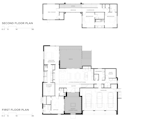Details
Credits
From Freese Architecture
MM31 is the first of a series of Midwest Modern speculative homes designed for the open market in some of the more established areas in Tulsa. Set in a neighborhood of modestly sized ranch style houses, this 3,750 square foot home takes cues of exterior materials and proportions from its neighbors. Midwest Modern is a term derived by Freese Architecture to describe its singular approach to designing architecture of the Midwest – decidedly modern forms but with warm, natural and often local materials, well crafted and made, rendering it uniquely relevant to its place.
The building form is composed of a muscular stone base with lighter stucco projections and dark siding infill. A reductive process of carving into the stone mass was employed to create openings for doors and windows. The stone is articulated with recessed horizontal courses at the floor, mid window and window header lines, creating datum lines that communicate some key proportions of the home. The three-car garage facing the street – forced by the shallow lot size - is visually reduced in importance by deeply recessing it from the front masonry plane, creating a deep shadow line over the monolithic garage doors.
The public entry is through a vertical slot carved into the stone front, punctuated by a cantilevered plate steel canopy overhead and a gate of tightly spaced wood louvers. Through the gate one enters a semi-private entry court that offers a calming ambiance sequestered from the public realm, enhanced with the soft reverberations of a trickling water feature in the center. A wood trellis creates a sense of enclosure overhead while allowing dappled sunlight and shadow play within. The entry court provides a sequential approach into the home, as well as an outdoor room enjoyed by the adjacent interior spaces.
Functional details are elevated from the mundane into ornament, including elongated metal roof scuppers, razor thin cantilevered steel canopies, and tight-grained wood trellises.
Well crafted exterior materials of Oklahoma-sourced stone, plate steel and solid timber give the home an added connection to the area and local culture.
The interior spaces are simply arranged, with proportions to allow abundant natural light from many sources. Multiple views to the outdoors and the courtyard provide a connection to the surrounding captured nature. A second level bridge connects the two upper level wings with a central overlook into the main public space. Large windows on either side of the bridge provide both views outward and additional natural light into the main space below.
The interior palate is kept simple and direct. White painted walls reflect the natural light, visually increasing the volume of the spaces. Natural woods, judiciously placed, add warmth and texture.
The elemental forms of the home give it an almost ancient aspect while decidedly modern and of this era, place and culture – the essence of Midwest Modern.















